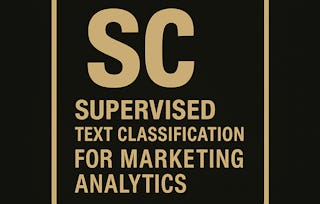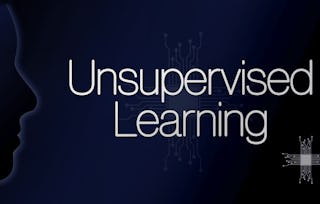Marketing data is often so big that humans cannot read or analyze a representative sample of it to understand what insights might lie within. In this course, learners use unsupervised deep learning to train algorithms to extract topics and insights from text data. Learners walk through a conceptual overview of unsupervised machine learning and dive into real-world datasets through instructor-led tutorials in Python. The course concludes with a major project.

Gain next-level skills with Coursera Plus for $199 (regularly $399). Save now.

Unsupervised Text Classification for Marketing Analytics
This course is part of Text Marketing Analytics Specialization


Instructors: Chris J. Vargo
Included with
Recommended experience
What you'll learn
Describe the concept of topic modeling and related terminology (e.g., unsupervised machine learning)
Apply topic modeling to marketing data via a peer-graded project
Apply topic modeling to a variety of popular marketing use cases via homework assignments
Evaluate, tune and improve the performance the topic model you create for your project
Skills you'll gain
Details to know

Add to your LinkedIn profile
2 assignments
See how employees at top companies are mastering in-demand skills

Build your subject-matter expertise
- Learn new concepts from industry experts
- Gain a foundational understanding of a subject or tool
- Develop job-relevant skills with hands-on projects
- Earn a shareable career certificate

There are 5 modules in this course
In this module, we will cover the fundamental concepts of topic modeling, also known as unsupervised machine learning on unstructured text documents. We will contrast unsupervised methods to supervised ones and survey common applications of topic modeling.
What's included
2 videos4 readings1 programming assignment1 discussion prompt
In this module, we will go under the hood inside a topic modeling approach and understand what assumptions drive topic model fit. We will also uncover how bag-of-words approaches to topic modeling work, and the natural language processing required to produce meaningful topic modeling features.
What's included
2 videos1 reading1 assignment1 programming assignment
In this module, we will cover how to parse through JSON-like data and segment it to create a corpus that is ready for the topic modeling process. We will cover how the data for your project is structured and its taxonomy.
What's included
2 videos2 readings1 assignment
In this module, we will take Amazon review data and load it into a corpus to preprocess it. We will cover how to build topic models from the data and also save those topic models.
What's included
2 videos2 readings1 peer review
In this module, we will learn how to evaluate the fit of topic models and use the best topic model to classify documents. We will also cover how to build topic models with pre-trained neural networks.
What's included
3 videos3 readings1 peer review
Earn a career certificate
Add this credential to your LinkedIn profile, resume, or CV. Share it on social media and in your performance review.
Build toward a degree
This course is part of the following degree program(s) offered by University of Colorado Boulder. If you are admitted and enroll, your completed coursework may count toward your degree learning and your progress can transfer with you.¹
Instructors


Offered by
Explore more from Data Analysis
 Status: Free Trial
Status: Free TrialUniversity of Colorado Boulder
 Status: Free Trial
Status: Free TrialUniversity of Colorado Boulder
 Status: Free Trial
Status: Free TrialO.P. Jindal Global University
 Status: Free Trial
Status: Free TrialO.P. Jindal Global University
Why people choose Coursera for their career





Open new doors with Coursera Plus
Unlimited access to 10,000+ world-class courses, hands-on projects, and job-ready certificate programs - all included in your subscription
Advance your career with an online degree
Earn a degree from world-class universities - 100% online
Join over 3,400 global companies that choose Coursera for Business
Upskill your employees to excel in the digital economy
Frequently asked questions
To access the course materials, assignments and to earn a Certificate, you will need to purchase the Certificate experience when you enroll in a course. You can try a Free Trial instead, or apply for Financial Aid. The course may offer 'Full Course, No Certificate' instead. This option lets you see all course materials, submit required assessments, and get a final grade. This also means that you will not be able to purchase a Certificate experience.
When you enroll in the course, you get access to all of the courses in the Specialization, and you earn a certificate when you complete the work. Your electronic Certificate will be added to your Accomplishments page - from there, you can print your Certificate or add it to your LinkedIn profile.
Yes. In select learning programs, you can apply for financial aid or a scholarship if you can’t afford the enrollment fee. If fin aid or scholarship is available for your learning program selection, you’ll find a link to apply on the description page.
More questions
Financial aid available,

